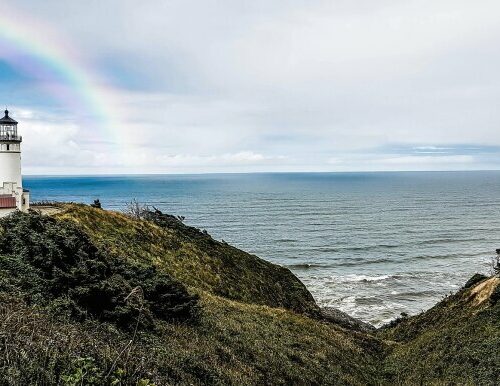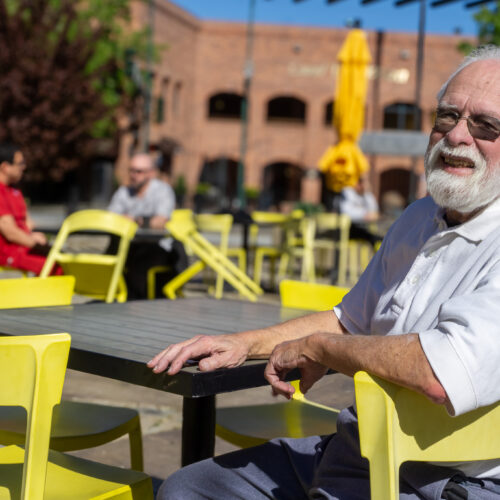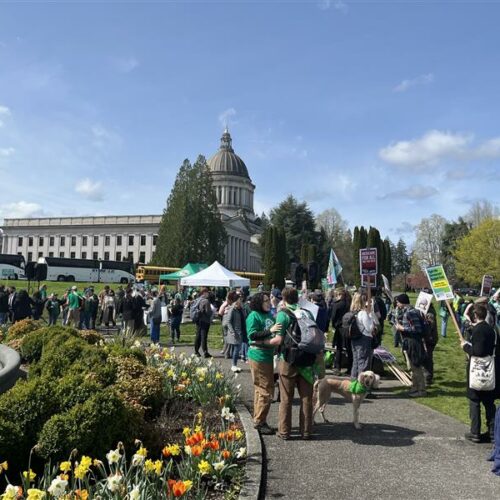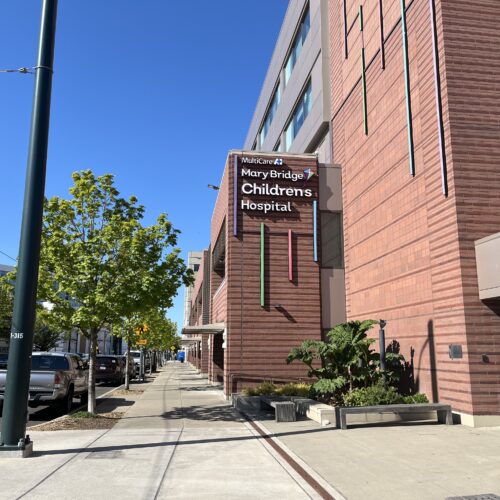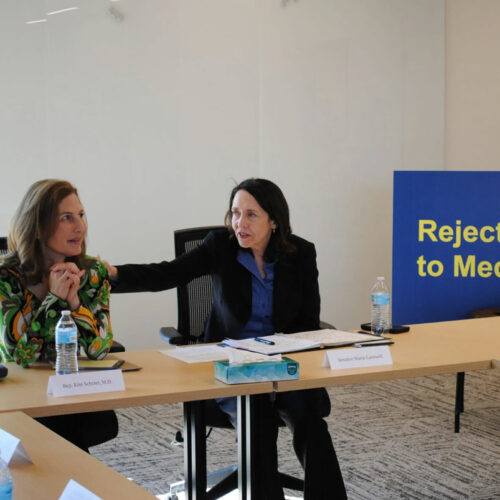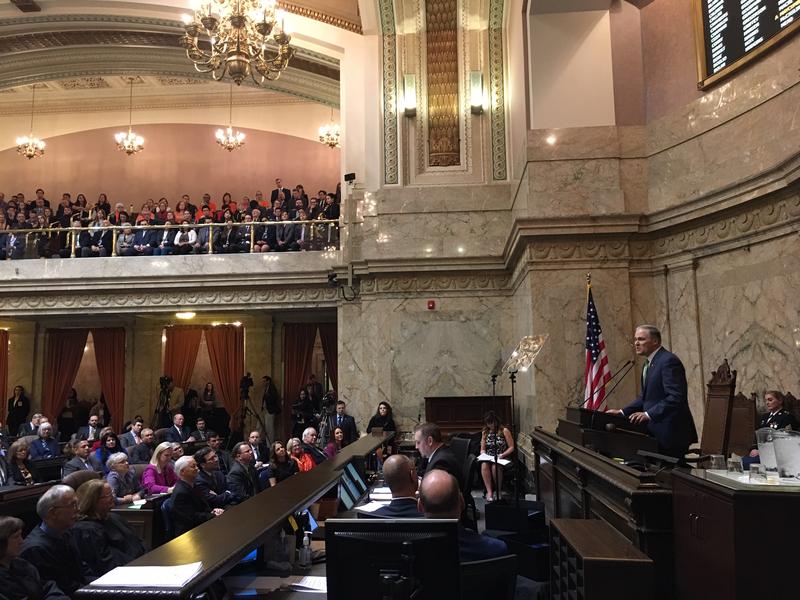
In State Of State Address, Jay Inslee Calls For Climate Change Action, Addressing Mental Health
Read On
Warning that Washington state is at a “tipping point,” Democratic Gov. Jay Inslee on Tuesday delivered a State of the State address that called on lawmakers to address carbon pollution, “transform” the mental health system and save Puget Sound orcas.
“Today offers us two choices,” Inslee said. “One, do we reflect on the success of our current story and decide we’ve done enough? Or two, do we rise up and write one of the worthiest chapters of our time that tells future generations who we are?”
Inslee, who is seriously considering a run for president, also sought to distinguish Washington state from Washington, D.C. and the policies of President Donald Trump, including the president’s views on immigration.
“While the president stokes fear of ‘the other’ at every opportunity, we’re the state that embraces our differences and diversity,” Inslee said.
Inslee delivered his address, titled “Washington’s Unwritten Chapter,” to a joint session of the Legislature assembled in the House chambers.
Inslee is counting on Democratic majorities in both the House and Senate to advance his policy initiatives this year, especially his package of climate change-related bills.
Climate change topped Inslee’s list of priorities in his speech.
“This is the 11th hour, but it is Washington’s hour to shine,” Inslee said.
He called on lawmakers to approve bills to phase out the use of fossil fuel electricty generation by 2045 and adopt a new low carbon fuel standard similar to California’s and Oregon’s.
On mental health, Inslee urged lawmakers to begin a five-year transition to move civil, or non-criminal, mental health patients out of the state’s psychiatric hospitals and into new community-based settings. He also highlighted the need to bolster the behavioral health workforce to meet growing demand.
In highlighting the dangers facing southern resident orca whales, Inslee harkened to last summer’s plight of Tahlequah, a mother orca who carried her dead calf for 17 days.
“We saw a mother’s grief. We felt it. Our hearts broke as we shared in her loss,” Inslee said. He added: “We have just one last chance to save these orcas.”
Now that the state is compliant with the McCleary ruling, a 2012 decision that found Washington was unconstitutionally underfunding its public schools, Inslee said it’s time for lawmakers to turn their attention to school safety, early education and career-connected learning. He also urged passage of his proposed statewide free college program called Washington College Promise. The program would guarantee income-eligible students access to college financial aid if they met certain conditions.
In his State of the State, Inslee also touched on the state’s homelessness crisis, endorsed passage of an initiative to the Legislature to replace the state’s de facto ban on affirmative action and touted his rural broadband initiative.
He also reiterated his call for lawmakers to repeal the state’s death penalty statute, which the Washington Supreme Court in October ruled unconstitutional. Previously, Inslee had imposed a moratorium on executions.
“We’re the state that put a stop to the death penalty, and I hope this Legislature acts to definitively end this practice once and for all,” Inslee said.
Reflecting on the increased diversity of the Legislature, Inslee noted that the new class of lawmakers includes one of the first Native American woman to serve in the House, Debra Lekanoff, and the first refugee elected to the Legislature, My-Linh Thai. Both are Democrats.
Of the state’s 147 lawmakers, 28 are new this year. A 29th new member will soon be appointed following the resignation of Democratic state Sen. Kevin Ranker, who resigned prior to the start of the session amid a workplace conduct investigation.
Inslee’s speech was also notable for what it didn’t include. He did not reiterate his call for a new capital gains tax, for example, or a hike in the business and occupation tax on services. He did, however, include both items in his proposed $54.4 billion budget for the next two years.
In a formal response to Inslee’s address, state Rep. Jacquelin Maycumber of northeast Washington accused the governor of pursuing an “extreme environmental agenda” and wanting more taxes and more state spending.
“It seems the governor has forgotten the people, the people like you and me, the ones working hard for every dollars the state government spends,” Maycumber said.
At a later joint news conference, House and Senate Republicans parsed the speech in the context of Inslee’s presidential ambitions.
“It was a list of things he wants to do, things that might be popular amongst Democratic primary voters in Iowa or New Hampshire, let’s say,” said state Rep. Drew Stokesbary.
The 2019 Legislative session is scheduled to run 105 days and adjourn on Sunday April 28.
Correction, Sept. 27, 2020: This story has been corrected to say that Rep. Lekanoff is one of the first Native Americans to serve in the Washington House. Our initial version said she was the first Native American woman in the House based on information from the Washington state House Democratic Caucus, which has since updated their guidance. The caucus says the late former Rep. Lois Stratton of Spokane was the first such woman.
Related Stories:
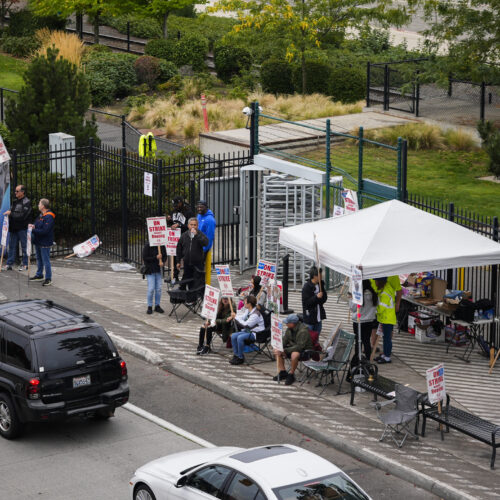
Striking workers in Washington could get access to unemployment claims if bill passes
A proposed bill that would give striking workers some access to the state’s unemployment benefits is getting closer to becoming law in Washington.
Majority lawmakers in the House Committee on Labor & Workplace Standards moved the bill out of committee on Friday, with a recommendation to pass it. This, after the bill narrowly passed the senate with 28 yeas and 21 nays earlier this month.
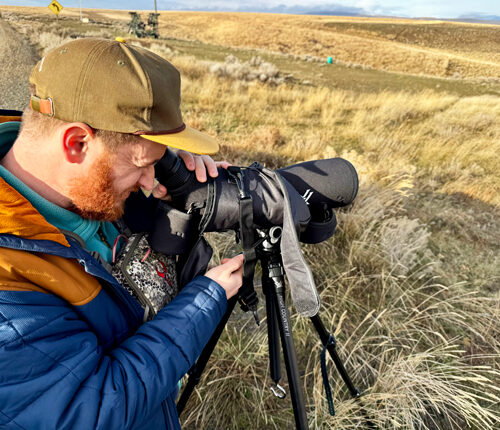
Searching for sage grouse: Looking for a chicken-sized needle in south-central WA
Seth Hulett, Audubon Washington’s senior program manager of the Columbia Plateau, searches through his spotting scope for sage grouse. (Credit: Courtney Flatt / NWPB) Listen (Runtime 4:12) Read In south-central
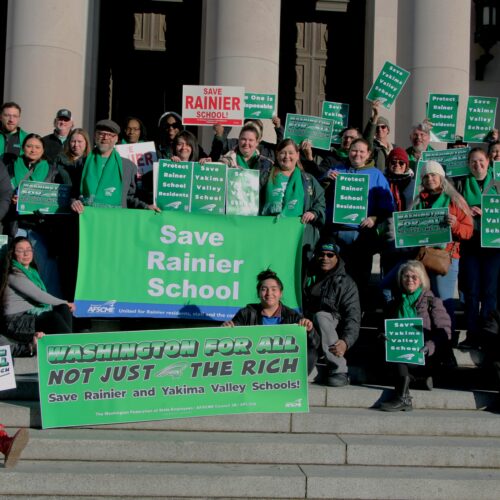
State considers closure of residential facilities for people with disabilities
Ever since he started working at Rainier School in Buckley, Washington, Willis McNabb has been hearing that the state was going to close it. This time, he said it feels more real.
“I’ve never been so worried as I am today,” McNabb said.
Since 1991, McNabb has worked at Rainier, which gives people with intellectual and developmental disabilities a place to find community, learn, work and receive comprehensive health treatment.


